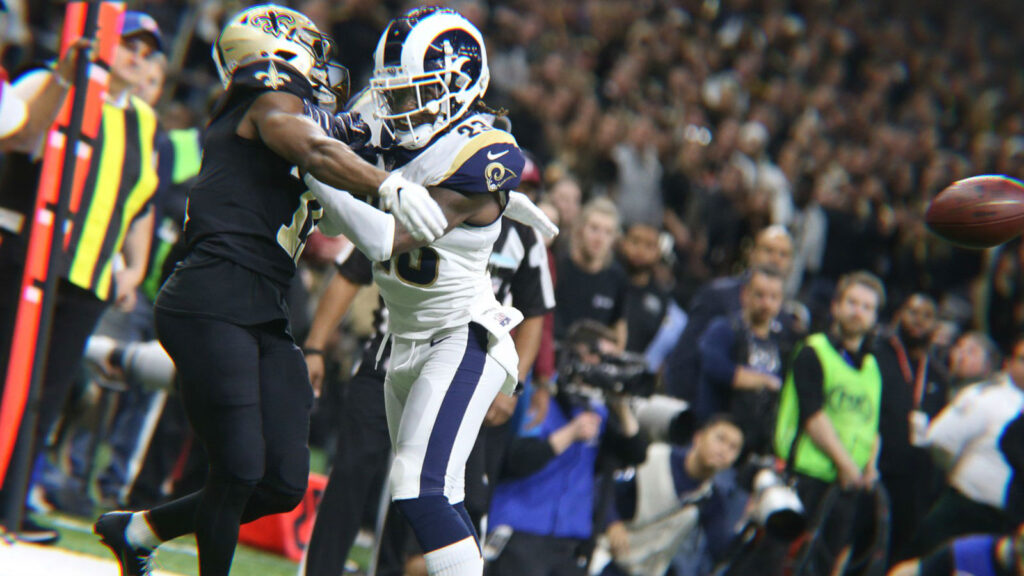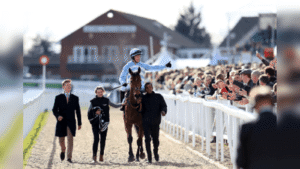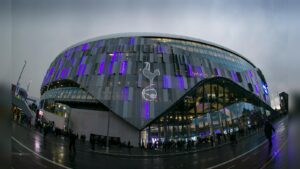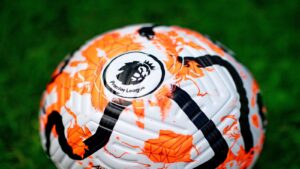Bad Calls, Mad Sports Bettors Contributing to Rule Changes

Must be 21+ to participate (18+ in KY). Gambling problem? Call 1-800-GAMBLER (CO, IL, IA, KY, KS, LA, MD, MO, NC, NJ, OH, PA, TN, VA). Call 1-800-NEXT-STEP (AZ). Call 1-800-9-WITH-IT (IN). CALL 1-877-770-STOP (LA). Must be present in LA (select parishes). Licensee partner Amelia Belle Casino. Minimum $10 deposit required. Minimum odds -500 or greater. Bonus Bets wager excluded from returns. New customers only. T&Cs, time limits and exclusions apply.
Determining the worst call in sports history is a subjective exercise. There are multiple filters to consider, even after stripping away obvious bias such as fandom or betting interest.
Did the officiating error just change the outcome of a game, or a season, the arc of a team, or two or four? The legacy of a player and perhaps even the way a league itself did business?
All those factors matter. But increasingly, in a social media age in which fans share forums with image-conscious brands and tastemakers, fan pressure can be marshaled instantly. The level of protest is measured in volume of impressions instead of volume of voice.
LATEST: Saints Continue Painful Playoff Tradition
The date: Jan. 5, 2020
The set-up: The Saints, third-seeded in the NFC playoffs and home-standing in the Wild-Card round against No. 6 Minnesota, had overcome a 10-point deficit in the fourth quarter to send the game to overtime. Bettors who took the 13-3 team at –7.5 points were already disgruntled, but the moneyline seemed a possibility, given the way New Orleans finished regulation. But Minnesota won the toss and plunged to the Saints’ 2 with a 43-yard Kirk Cousins rainbow to Adam Thielen.
The play: The Saints had stopped running back Dalvin Cook on successive rushes to set up a third down, where Cousins lofted a ball to the left corner of the end zone for a Kyle Rudolph touchdown. But, of course, it wasn’t that simple. Numerous replays appeared to show that Rudolph had pushed off against defensive back P.J. Williams. The play was reviewed, or maybe it wasn’t. Saints and Saints fans and coaches fumed. Another New Orleans season ended in a pass interference debate.
The result: Minnesota won, 26-20.
The betting implications: Vikings bettors rejoiced.
The most egregious call in sports might have occurred in a ballpark in the mid-1920s on a Wednesday, under a hot sun with an umpire stinging from a hangover and in need of shade. Or a muddy football field in New Jersey or a rink in Saskatoon.
Any call like that would have made few ripples beyond the immediate days of word of mouth, without an electronic echo chamber to stoke them into mass outrage. Yellowed news pages wouldn’t convey the unrest.
Today is different. Second-screen communal commentary has become a natural extension of sports viewership. Professional sports leagues, networks and gambling companies alike are therefore heavily invested in legal sports betting, particularly mobile in-play wagering as a natural evolution of the current most important word in the sports industrial complex: Engagement.
Angry With NFL After No-Call, Saints Fans Resort To Lawsuits, Billboards https://t.co/niWVgfkcVL
— NPR (@NPR) January 22, 2019
Engagement can quickly yield enragement in this environment, with on-field officials and their superiors all subject to the repercussions of errant calls left uncorrected by loopholes or judgment that failed in real time, only to be revealed by ad nauseum review.
The response to Jim Joyce foiling an Armando Galarraga perfect game in 2010 with an admitted botched call would be explosively more viral – and assuredly more vitriolic – today on a Twitter platform with 330 million users, as compared to the 40 million when the first base umpire ruled Cleveland’s Jason Donald safe at first base with two out in the ninth inning in Detroit. Granted, instant replay would have corrected the call today, which would have been extremely important not only to Tigers fans but the sports bettors who had begun placing in-game wagers on no-hitters and perfect games by the seventh inning.
"Gambling tends to increase interest in the outcomes of games, which may mean more outrage at mistakes or perceived mistakes,” David Schwartz, professor and gaming historian at the University of Nevada, Las Vegas told Bookies.com in an email. “That's not to say that sports fans who don't bet on games take everything in stride.
“Remember what Bill Buckner's unfortunate misplay in the 1986 World Series meant to Red Sox fans. But it does raise the stakes for viewers/bettors, which means that any perception of controversy may be amplified.”
The fallibility of humans, even collections of seven of them in an NFL game, has never been so exposed. Those undertaking the thankless occupation have never been so subject to scrutiny or scorn. A recent study by Boston University revealed that umpires made the wrong call on 34,294 pitches in 2018, which is not eligible for review under current rules.
Although black market gambling elicits a more rife environment for corruption than a regulated alternative, the emergence of legal sports betting in more states has made game-fixing a ready crutch for aggrieved or suspicious fans.
“There was one referee that had called two very close games, and I think he called them good when they were clearly not good upon replay,” Jennifer Roberts, Associate Director at the International Center for Gaming Regulation at UNLV, told Bookies.com. “And I think it drove a lot of attention to, ‘Maybe we need to now investigate it. Is this referee just having a bad day or are there other issues?’
“I think it actually probably highlights those issues and probably, unfortunately, to the detriment of some referees where they might always be questioned over whether they are they influencing the outcome of a wager versus just making a poor call.”
How Do Sportsbooks React to Officiating Controversy?
A spate of erronenous calls in the past year have permeated high-profile sporting events including the NFL and NHL playoffs and NCAA Basketball Tournament. Those instances could seemingly undercut the position of leagues that have asserted that official league data is crucial to the proper settlement of games, and therefore, wagers.
But it could also put sportsbooks in the middle of a predicament.
When the NFL admitted a controversial non-call of pass interference against the Los Angeles Rams in the NFC Championship Game was an error, did it tacitly confirm that every subsequent statistic and outcome was in error, or at least invalid? Officials made a judgment call that was not reviewable at the time.
Attempts to coerce commissioner Roger Goodell to take “corrective measures" were litigated unsuccessfully. Bettors, especially those on mobile devices with a stake, a grip, and a virtual megaphone, were not placated, especially in the moment.
#Rams CB Nickell Robey-Coleman told me he rewound the controversial no-call in the NFC title game about 1,000 times. Still thinks ball might have been tipped. Fast play and “it was really up to the ref.” So what’s his message to #Saints fans watching angry or boycotting today? pic.twitter.com/hyMZebjUtn
— Tom Pelissero (@TomPelissero) February 3, 2019
“You're going to see more and more bettors that are taking to social media,” Roberts said. “I see it all the time on Twitter. There's people complaining about any restrictions on wagering, whether they've been excluded from wagering, so it's just going to continue. The social media kind of shaming will probably never go away.”
Kresimir Spajic, senior vice president and managing director of online gaming and sports betting at Hard Rock International, said his company has so far been unaffected.
“Leagues are in charge of rules and all decisions related to a game. We do business based on official results,” he told Bookies.com in an email. “We haven’t had issue with our players.”
Some sportsbooks hedge their literal bets, however. FanDuel Sportsbook in New Jersey made a play for customer goodwill in a brutally officiated Stanley Cup playoffs this spring, offering bettors up to $100 site credit if they had bet on a St. Louis Blues game in which an uncalled hand-pass that led to the winning goal in overtime by San Jose (below).
At a sports betting seminar in England earlier this year, RedZone.bet Managing Director Joe Petyt said his company is forced to suspend markets when a soccer game is halted for a video assistant replay ruling. "As soon as we think there will be a VAR incident, we suspend that market,” he said. “That might mean that a game is suspended for five or six minutes each, which is pretty bad on an individual game basis.
“However, this could be worse for anyone tracking a six-fold weekend accumulator on the Premier League. If the VAR incidents don’t overlap, their bets could potentially be suspended for 30 of the 90 minutes. This is obviously a terrible customer experience.”
Greater oversight, whether directly attributed to sports betting, figures to be a new reality.
In February, the NCAA’s David Worlock told ESPN in a statement that during the upcoming NCAA Tournament the organization would “review all shots made at the buzzer, as necessary, in the interest of accuracy of score and team and player statistics and even if the outcome of the game isn’t riding on the officials’ call.” ESPN extrapolated a connection to sports betting by noting two men’s college basketball games where the points spread or over/under was impacted by incorrect scoring of shots at the buzzer.
A correction on our previous comments: pic.twitter.com/pfTtKjlrqx— Inside the NCAA (@InsidetheNCAA) February 8, 2019
The NCAA quickly softened its position – shots at the end of games were not uniformly reviewed – while admitting a need to address “the new gambling environment.”
Every other league, sportsbook and bettor will eventually have to do the same.
Most Controversial Big-Game Calls, Post-PASPA
Via https://t.co/74A2QGSpW3, not a good night at all for home plate ump Lance Barksdale, especially on the outer edge of the zone to righty hitters (plot is from the ump's POV) pic.twitter.com/jpqwDYa8tS— Jay Jaffe (@jay_jaffe) October 28, 2019
Will Robot Overlords Re-Sanctify World Series Strike Zone?
The date: October 27, 2019
The set-up: The Washington Nationals absolutely were not supposed to be playing in Game 5 of the World Series. Not after losing star outfielder Bryce Harper in the offseason, their lead-off hitter – Trea Turner – for a key chunk of the early season, and not after working around an untrustworthy bullpen all season. But there they were, in the admittedly unenviable position of trying not to waste the 2-0 series lead they’d crafted at Houston to start the series against the consensus-favorite Astros. Houston had tied the series with two wins in the District and had ace Gerrit Cole on the mound. It was going to be difficult enough.
The play: There was not so much a single play, but a series of micro outrages on a macro scale committed by home plate umpire Lance Barksdale, this according to the reaction of the Nationals players and coaches and a viewing public following pitch location on TrackMan software.
There was the sinker that Washington reliever Tanner Rainey guided through the strike zone that was ruled a ball in the sixth inning. Barksdale attempted to pin it on catcher Yan Gomes apparently showing him up by heading off the field. At least there was a reason. Because then there was the 3-2 fastball that the Nationals Victor' Robles took from Cole for an apparent fourth ball that was ruled a strike. Neither he nor manager Davey Martinez were ejected after complaining vociferously.
???? pic.twitter.com/JCKJJHIifD— Rob Friedman (@PitchingNinja) October 28, 2019
The result: The Nationals lost 7-1 after being overwhelmed in every facet. They were gracious afterwards, but the sporting public threw tantrums for them. Houston took a 3-2 series lead heading home, pushing it to the brink of a second world championship since 2017. With data analysts, social media antagonists and even the Washington Post poring over the very human and very flawed plate zone work for Barksdale, the slow drum beat of baseball marching toward robotic umpires quickened. Maybe.
The betting implications: The huge favorites edged closer to fulfilling their promise, while Nationals bettors, especially those who jumped onboard before their incredible postseason run ramped up, fumed.
Saints-Rams: Interference That Wasn’t (But Was)
The NFL has been the national pastime for much longer than baseball. It is the alpha of viewership and betting handle nationally and a full blitz into every demographic of the country. It sets the narrative of the American sports weekend from September until February.
The date: Jan. 20, 2019
The set-up: In the NFC title game, the second-seeded Rams met the top-seeded New Orleans Saints. Led by breakout quarterback star Jared Goff, the Rams had beaten the Saints at home in the regular season. The Saints, despite displaying vulnerability late in the season, were a potent contender for a second Vince Lombardi Trophy behind veteran quarterback Drew Brees and running back Alvin Kamara, especially in the Mercedes-Benz Superdome. They entered as an aggregate three-point favorite.
The game lived up to the billing, distilling to what appeared a culminating drive by Brees as a party prepared to erupt inside the dome and all through the French Quarter.
The play: On third-and-10 from the Rams’ 13, with the score tied at 20, and 1:49 remaining, Brees threw a pass that was, according to the box score, "incomplete short right intended for Tommylee Lewis.”
It was not that simple.
As Lewis darted up the right sideline and began to turn for the pass, defensive back Nickell Robey-Coleman made heavy contact without turning for the ball. The nanoseconds between contact and the expected launch of a flag stretched into infinity. And infamy.
Robey-Coleman told ESPN: “In my mind, yes, I thought I was going to get flagged. Then they said incomplete, and I got up and saw the crowd going crazy. When you catch a break like that, you’ve got to take advantage."
As dismay morphed into outrage on the field, on the broadcast and in social media, the Saints settled for a go-ahead field goal, then, apparently in a group flummox, allowed the Rams to advance quickly downfield in the final two minutes.
The result: Greg Zuerlein kicked a 48-yard field goal with 15 seconds left to force overtime and, after Brees was intercepted, sent the Rams to the Super Bowl with a 57-yarder in extra time. Social media erupted, Saints fans sought legal remedies, but the Rams went on to fall to the New England Patriots for the league crown.
Several players and Saints coach Sean Payton were quoted as saying officials told them they believed the ball was tipped. The play was not reviewable.
The betting implications: Saints bettors were angry. Also, a New Orleans touchdown would have forced the Rams into going for six on their final drive to bring the 55-point over into play.
The aftermath: The NFL altered its rules in the offseason to make pass interference calls challengeable by coaches and reviewable by officials.
“I told the owners we need to get to a place, and I felt strongly we should have (offensive pass interference) and (defensive pass interference) and that we should be able to throw flags (that were not thrown on the field),” Goodell said. “Everyone in there finally got to understand through a long process and a lot of discussion, everyone wanted to get it right. Some had to remove themselves from long-shared views.”
New Orleans still holds a grudge. And, in September, it had its day in court. A Louisiana judge in July ordered Goodell and three officials involved in the play to testify under oath in New Orleans in a $75,000 suit. The low monetary value of the suit kept it out of federal court, where the NFL has prevailed.
Uncalled Trip Helps Blues Upend Bruins
The date: June 7, 2019
The set-up: The St. Louis Blues, one of the worst teams in the NHL at the mid-point of the season, were not even supposed to be there. Game 5 of the Stanley Cup final, tied with the Boston Bruins at two in the series and ahead 1-0 in the game.
The play: A late-season rush, and playoff upsets of Winnipeg, Dallas and San Jose, had put Tyler Bozak on the TD Garden ice with a chance to trip the Bruins’ Noel Acciari and change a series, a franchise’s legacy and NHL league rules inexorably. Moments after the uncalled trip, which occurred with an official close behind the play and staring toward Acciari, David Perron scored to seal what would eventually be a 2-1 win.
The result: Boston responded with a 5-1 thrashing of the Blues in St. Louis, but fell short, 4-1, back home in Game 7. Boston undoubtedly had chances to regain its edge in the series despite the universally decried non-call, but surrendering any moment in a series that goes to the seven-game limit it crucial. The Stanley Cup championship was the first in the 51-year history of the Blues, ending the longest active drought in the NHL.
The betting implications: Boston entered the game at around -155 at most sportsbooks.
The aftermath: The NHL announces it will expand the use of replay to correct errors regarding goalie interference and offsides, but not for initiating a penalty or other judgment calls.
Sharks Exploit Generous Penalty Against Knights
The date: April 23, 2019
The set-up: The Vegas Golden Knights were a dozen or so line shifts from advancing a step closer to a defense of their NHL Western Conference championship. They led, 3-0, halfway through the third period in Game 7 of their first-round series at San Jose. They were in control despite some imperfections.
But after an otherwise routine faceoff to the left of goaltender Marc-Andre Fleury, a season for the Knights and a postseason for the reputations of NHL officials continued to unravel.
The play: Moments after the Sharks won the faceoff and proceeded to set up a shot, Joe Pavelski was impacted first by Cody Eakin and then another Knights player before careening down. The crack of Pavelski’s head on the ice left a pool of blood freezing under him as officials ruled a five-minute major penalty on Eakin.
The Las Vegas Review-Journal reported series supervisor Don Van Massenhoven’s explanation: “The referees called a cross-checking penalty for an infraction that caused a significant injury. In their judgment, the infraction and its result merited a major penalty.”
The result: The Sharks scored four goals in the next 10:01 to take a 4-3 lead. The Knights tied it with 47 seconds left but San Jose won in overtime to advance to the second round of the playoffs.
The betting implications: San Jose entered the game as a -120 moneyline favorite.
The aftermath: As part of the officiating overhaul, reviews will be made of all major penalties.
Unseen Hand Pass Helps Sharks Beat Blues
The date: May 15, 2019
The set-up: The Sharks would have become the iconic embodiment of the malaise of NHL playoffs officiating had they advanced to win the Stanley Cup. In consecutive playoff series, they benefited from highly controversial, uniformly condemned botched adjudications.
The play: At 5:23 into overtime in Game 3 of the Western Conference finals at St. Louis, Sharks right wing Timo Meier, sliding on his knees away from his offensive goal at the top of the right circle, caught a fluttering puck and flung it like a hot biscuit across the slot, where teammate Erik Karlsson skated easily on to it and fired the game-winner past Blues goalie Jordan Binnington. The play was not eligible for challenge.
The result: The Sharks won, 5-4, to take a 2-1 series lead, but the Blues recovered to win the series and eventually their first Stanley Cup.
The betting implications: St. Louis had entered the game a -145 moneyline favorite, with 66 percent of public money bet on the Blues at Fan Duel.
The aftermath: The NHL expansion of replay challenges includes plays that would have included stoppages of play, such as the Meir hand pass.
About the Author

Brant James has written for SI.com, ESPN.com, USA TODAY and the Tampa Bay Times, among other publications.

 Supreme Novices' Hurdle Trends for the 2026 Cheltenham Festival
Supreme Novices' Hurdle Trends for the 2026 Cheltenham Festival  Next Leicester City Manager Odds - Ralph Hasenhuttl, Gary Rowett Favourites
Next Leicester City Manager Odds - Ralph Hasenhuttl, Gary Rowett Favourites  Love Island All Stars Betting Odds 2026 - Millie and Zac Favourites as Harrison and Jessy Enter
Love Island All Stars Betting Odds 2026 - Millie and Zac Favourites as Harrison and Jessy Enter  Next Tottenham Manager Odds: De Zerbi Strong Favourite to Replace Sacked Frank
Next Tottenham Manager Odds: De Zerbi Strong Favourite to Replace Sacked Frank  Premier League Free Bets & Betting Offers - Brentford vs Arsenal
Premier League Free Bets & Betting Offers - Brentford vs Arsenal  Next Premier League Manager Sacked Odds: Fabian Hurzeler Next In Line After Frank, Dyche Sackings?
Next Premier League Manager Sacked Odds: Fabian Hurzeler Next In Line After Frank, Dyche Sackings?
Comments